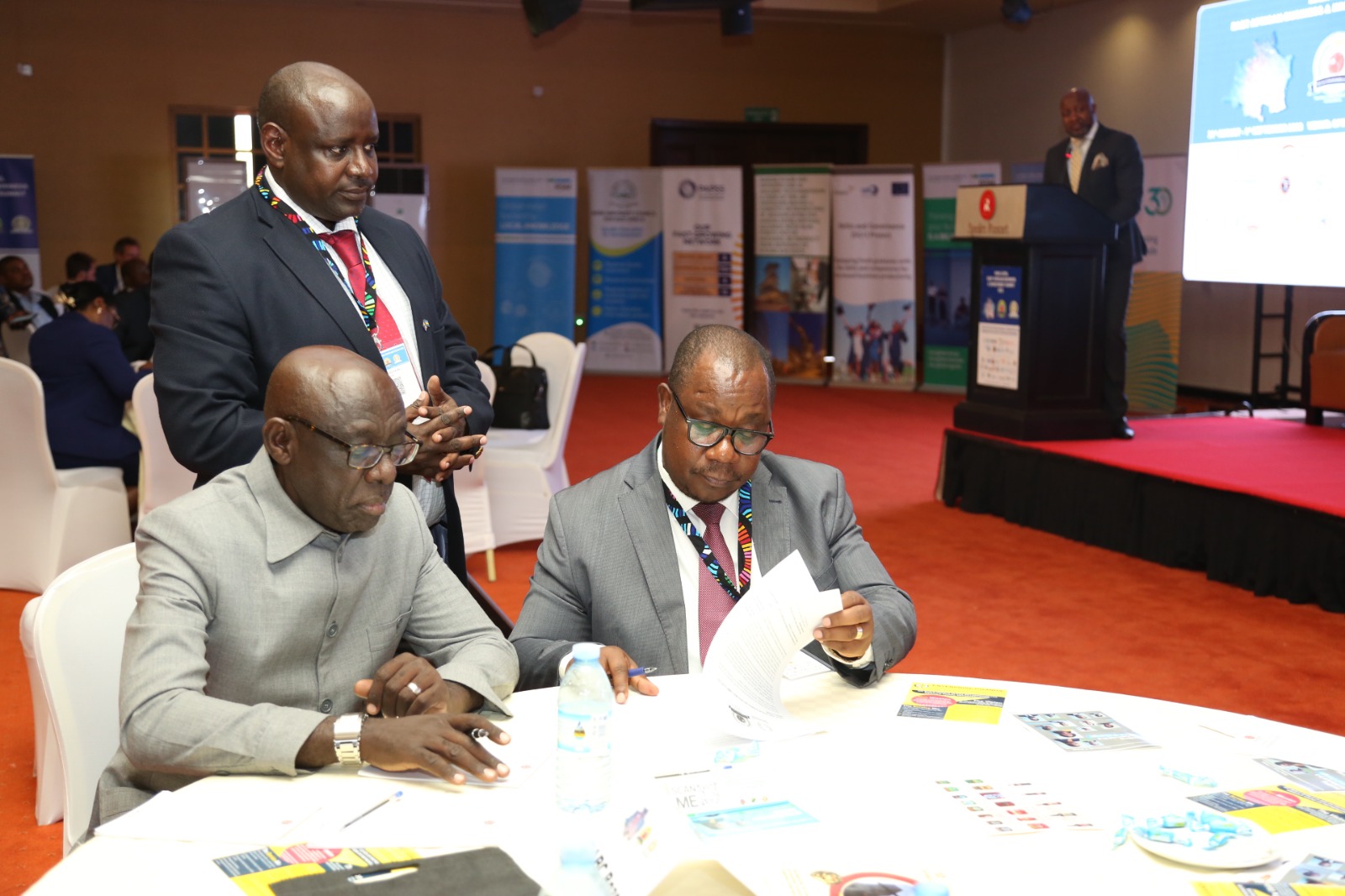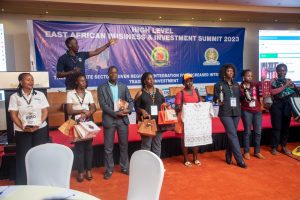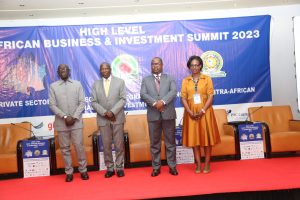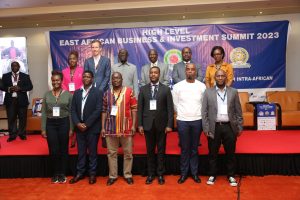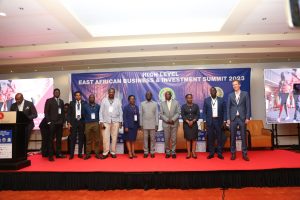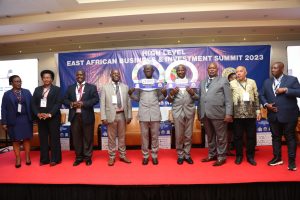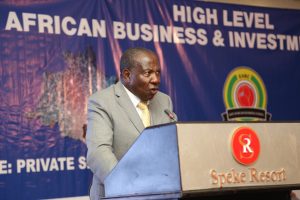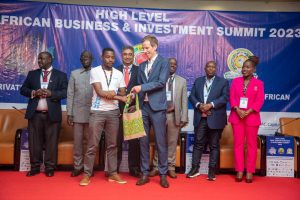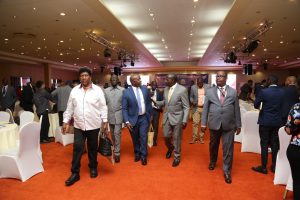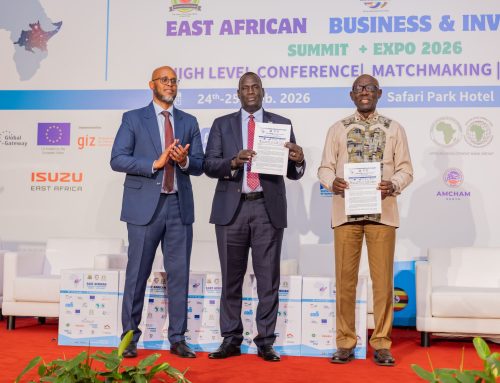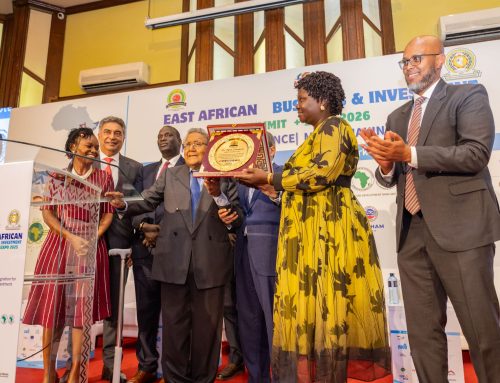The East African Business and Investment Summit & Expo 2023, organized by the East African Business Council (EABC) and the East African Community (EAC) Secretariat, took place from August 31st to September 1st, 2023, in Kampala, Uganda.
The summit brought together over 500 delegates, including Ministers, senior government officials, industry leaders, potential investors, and representatives from financial institutions. These delegates engaged in discussions concerning the successes and challenges facing trade and investments within the East African Community (EAC) and the African Continental Free Trade Area (AfCFTA). The primary objective was to chart a path for the future, identify necessary policy reforms, and leverage opportunities for increased intra-African trade and investment.
The East African Business and Investment Summit & Expo 2023 was graced by the presence of Rt. Hon. Rebecca Alitwala Kadaga, 1st Deputy Prime Minister and Minister for East African Community Affairs, Republic of Uganda who officially opened the Business and Investment Summit. Hon Kadaga called for elimination of persistent non-tariff barriers that hinder intra-East African Community (EAC) trade, full implementation of AfCFTA, compliance with EAC Common Market commitments, and an increased focus on manufacturing to boost the EAC’s Gross Domestic Product.
Hon. Rt. Hon. Rebecca Alitwala Kadaga, the 1st Deputy Prime Minister officially launched the EAC-EABC Technical Working Group, that will be responsible for monitoring the implementation of the Summit’s resolutions.
The summit appreciated the vast investment opportunities in East Africa presented by Burundi Development Agency (ADB), Ministry of Investment, Republic of South Sudan Juba, Tanzania Investment Centre (TIC) and Uganda Investment Authority (UIA).
The East African Business and Investment Summit & Expo 2023 expressed its appreciation for innovations, collaborations and partnerships from academia and committed to promoting technology transfer between academia and industry.
Hon. Amb Ezechiel Nibigira, Chair of the EAC Council of Ministers and Minister for East African Community Affairs, Youth, Sports, and Culture, Republic of Burundi and Mr. Dennis Karera, Vice Chairperson of East African Business Council received and signed the resolutions of the East African Business and Investment Summit & Expo 2023. In his address, Hon. Amb Nibigira urged the private sector to tap into the EAC and AfCFTA markets to create jobs for the youth and prepare for competition in the AfCFTA market. This entail simplifying trade procedures, improving access to finance, and establishing joint venture partnerships for youth-led businesses.
Key Resolutions of the East African Business and Investment Summit 2023 for the Partner States’ Governments and the EAC Secretariat:
- Trade and Investment Climate – Making East Africa a Leading Trade and Investment Destination:
- Develop strategies and programmes to foster an increase in intra-EAC trade to 40% within five years.
- Prioritise harmonization of trade and investment regulations and policies within the EAC to facilitate promotion of EAC as a single investment destination.
- Enhance coordination and cooperation among regulatory agencies for consistent implementation of trade and investment regulations.
- Prioritize funding and development of cross-border infrastructure projects to improve regional connectivity and reduce trade barriers.
- Strengthen cooperation between revenue/customs authorities to combat illicit trade and corruption while promoting intra-regional trade and investment.
- Accelerate public-private partnerships at national and regional levels to encourage investments.
- Establish robust legal frameworks and investor protections to create a conducive business environment.
- Foster the exchange of information, best practices, and research data across the region.
- African Continental Free Trade Area – Positioning the Private Sector to Take Advantage of the AfCFTA:
- Develop regional harmonized positions on pending issues under AfCFTA negotiations.
- Nominate Panelists from all EAC Partner States to the AfCFTA Dispute Settlement Body.
- Expedite the development of the EAC Tariff Offer for Category B & C Products by October 2023.
- Enhance public-private collaboration and dialogue for the full implementation of the AfCFTA Agreement.
- Develop a comprehensive strategy to maximize the benefits of the AfCFTA.
- Provide capacity building to SMEs for their participation in AfCFTA and promote intra-industry trade.
- Sustainable Industrialization and Value Chains in Africa:
- Accelerate exports of high-demand products to match regional growth amid competitive international market.
- Increase manufacturing capacity, diversify production, and develop competitive medium and high-tech sectors.
- Strengthen and prioritize regional supply and value chains for faster development in sectors like agro-processing, pharmaceuticals, and energy.
- Promote backward integration to utilize natural resources and raise awareness about the African Continental Free Trade Area (AfCFTA).
- Embrace regional standards and improve product quality through effective packaging and pricing.
- Address unfair competition and promote “Buy East Africa, Build East Africa” (BEABEA) to boost regional consumption and production.
- Foster the implementation of the EAC Industrialization Policy and Strategy.
- Encourage investments in manufacturing, agriculture and pharmaceuticals.
- Develop programs for skills development and technology transfer to support sustainable industrialization and value chains.
- Tax Regime Harmonization in EAC:
- Engage in dialogue with private sector in harmonization of domestic taxes, including excise duties, VAT, income tax, and tax incentives, and lowering the cost of implementing the Digital Tax Stamp System across the EAC region.
- Review the EAC Agreement for Avoidance of Double Taxation and Prevention of Fiscal Evasion with Respect to Income Taxes to allow for implementation by Ratified Parties through the Variable Geometry Principle.
- Fasttrack elimination of all discriminatory taxes on EAC products.
- Digital Economy: Unlocking Business Opportunities in the EAC & AfCFTA through Digital Skills:
- Foster closer collaboration with educational institutions to enhance the knowledge and skills of young people for the digital era.
- Develop policies that create an enabling environment for technology adoption and innovation.
- Encourage collaborative efforts between the public and private sectors to harness the full potential of the digital economy.
- Promoting digital skills capacity building for preparedness of utilization of emerging technologies
- Trade in Services:
- Address the high cost of air travel through the implementation of open skies in the EAC.
- Encourage all EAC Partner States to join the One Network Area to enhance communications.
- Address issues related to reverse VAT on trade-in services.
- Encourage Business Membership and advocacy organizations to push for the implementation of commitments made by the Partner States regarding the movement of services and service providers.
- SMEs, Women and Youth in Business
- Invest reasonable resources in Research and Development (R&D) to achieve industrialization and increased productivity.
- Establish an SMEs and startup fund to facilitate access to finance.
- Implement a credit bureau system to verify the creditworthiness of SMEs.
- Organize annual SMEs investment forums to strengthen partnerships and facilitate business deals.
- Develop policies and programs to support SMEs.
- Climate Change and Agriculture
- Promote Sustainable Farming Practices:
-
- Encourage organic farming, agroforestry, and regenerative principles.
- Reduce synthetic input usage, aligning with EU targets for 2030.
- Educate and empower small-scale farmers on climate change impacts.
- Promote regenerative and smart agriculture, emphasizing efficiency and sustainability.
- Adopt Integrated Pest Management (IPM) strategies and coordinate with conservation efforts.
- Implement regenerative practices to enhance soil health and biodiversity.
- Support climate adaptation methods in livestock farming.
- Eliminate pollution and chemical poisoning in soil and food.
- Invest in soil health training and information sharing.
- Encourage efficient irrigation practices.
- Promote tree planting for food production and conservation.
- Enhance Resource Management:
- Provide water harvesting and recycling training.
- Support climate-smart irrigation.
- Disseminate climate change information to farmers.
- Advocate for climate-smart farming practices.
- Implement anti-deforestation policies to protect ecosystems and agriculture.
- Promote Sustainable Business Practices:
- Support the EAC Carbon Trade Platform and invest in renewable energy projects.
- Encourage the transition to green transportation.
- Set sea transport goals to reduce carbon emissions.
- Create an EAC carbon trade platform to incentivize carbon reduction and offset projects.
- Improve food production by utilizing climate forecasts, drought-tolerant seeds, and climate-smart irrigation.
- Continuously sensitize farmers to climate change impacts and provide seasonal climate forecasts.
- Provide support to farmers to reduce synthetic fertilizers and pesticides and adopt alternative methods.
- Eliminate pollution and chemical poisoning in soil and food.
- Enhance water harvesting and recycling training to address water scarcity and improve resource management.
- Facilitate information sharing among stakeholders to promote climate-resilient agriculture and land management practices.
- Promote the transition to green transportation through biodiesel production, waste recycling, and a shift from air to sea freight for exports.
The summit extended its appreciation to Private Sector Foundation Uganda (PSFU), Uganda Manufacturers Association (UMA), Uganda Investment Authority (UIA), Afreximbank, German Development Cooperation (GIZ), RSM Eastern Africa, Madhvani Group, Standard Chartered Bank, PAC Capital, SEATINI, and PWC for their valuable partnerships in making the East African Business and Investment Summit & Expo 2023 a success.
The EAC Business and Investment Summit & Expo 2023 was officially closed Hon. Matia Kasaija, the Minister of Finance, Planning, and Economic Development. He called for a borderless East Africa to enable the free movement of goods and services, similar to the former East African Community (EAC). Additionally, he stressed on unity and the significance of providing increased market access to East African-made products.
Signed by
| Hon. Amb. Ezéchiel Nibigira, Chair of the EAC Council of Ministers & Minister, Ministry of East African Community Affairs, Youth, Sports and Culture, Republic of Burundi | Mr. Dennis Karera, Vice Chairperson, East African Business Council
|
| 1st September 2023 | |
-END-

